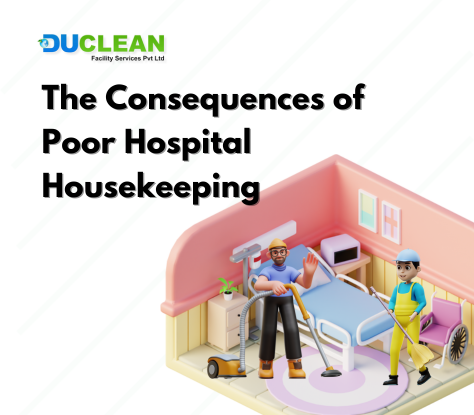Hospitals are the most venerable places where housekeeping is the most potent tool to keep the premises clean and sanitized. The healthcare industry caters to millions of patients daily, so hospitals should be precise in their housekeeping. Proper sanitization and in-depth cleaning are the first lines of control for any infections, contingencies, viruses, and poor housekeeping that can lead to disastrous effects.
This comprehensive article will delve into the consequences of poor hospital housekeeping.
Outcomes of Neglected Housekeeping in Hospitals:
High Risk of Infections
Neglecting housekeeping in the healthcare sector can cause heavy damage. Lack of proper housekeeping, sanitation, and cleaning can increase the risk of the spread of deadly infections and viruses. The accumulation of bacteria and viruses can easily infect patients, staff, and visitors. This situation can trigger a medical emergency. So, it becomes crucial to have proper housekeeping to minimize the risk of infections and contingencies.
Unhealthy Surroundings
Poor housekeeping can promote unhealthy surroundings for everyone present on the hospital premises. Untidy floors, non-disposed waste, the collection of hazardous waste, and non-sanitized surroundings can lead to accidents, injuries, and infections that can impact the hospital staff severely. The role of housekeeping in hospitals is to maintain the decorum of cleanliness and cater to the basic requirements for maintaining healthy working conditions.
Lowering Patients Satisfaction
A tidy, clean, and sanitized surrounding boosts a positive environment. A positive environment helps patients stay calm and happy, resulting in a faster recovery. On the other hand, an untidy and non-sanitized atmosphere degrades patient satisfaction making them uncomfortable and worried, affecting the overall experience negatively.
So hospital housekeepers must uphold the standards of cleanliness and sanitization, as it directly impacts the patient’s consensus and raises the risk of infections, accidents, an ill environment, and contingencies.
Housekeeping Standards to Prevent Adverse Effects
Frequent Training
The healthcare industry is very much dependent on housekeeping. Housekeeping for hospitals needs professionally trained and skilled housekeepers. To ensure the utmost cleanliness, sterility, and disposal of hazardous waste housekeepers should be skilled, and regular training keeps the staff ready to tackle any situation.
Adequate Tools and Equipment
An effective cleaning process needs the proper tools and equipment. An efficient housekeeping department needs all the required tools, cleaning agents, chemicals, safety tools, and modern equipment. Using modern solutions increases efficiency and also ensures top-notch cleaning of every corner.
Housekeeping Policies
It is a must for every housekeeping department to have policies that address situations like infections, waste management, and any contingencies and solutions to them. Housekeeping policies help the housekeepers be on their toes to tackle any situation. These policies contain every minute detail regarding the use of cleaning chemicals, safety guidelines for patients and staff, the usage of necessary tools and equipment, and safety drills for emergencies.
Regular Checks
Regular checks or timely audits are very crucial in housekeeping. These audits uphold the housekeeping standards, ensure safety measures, ensure proper use of safety and cleaning tools, and dispose of hazardous waste. Regular checks and audits build credibility and emphasize the importance of housekeeping in hospitals. So it’s a must for a housekeeping department to run frequent audits.
Conclusion
There can be serious and distinct consequences of low hospital cleaning. Poor housekeeping increases the risk of infections, lowers patient satisfaction, and produces unhygienic conditions for patients and staff. To reduce this situation and to preserve a clean, safe healthcare environment that promotes healing and well-being, it is essential to uphold strict housekeeping standards, which include periodic audits, proper equipment, regular training, and strict rules.

